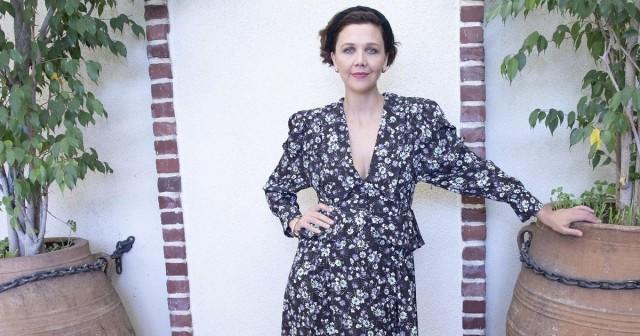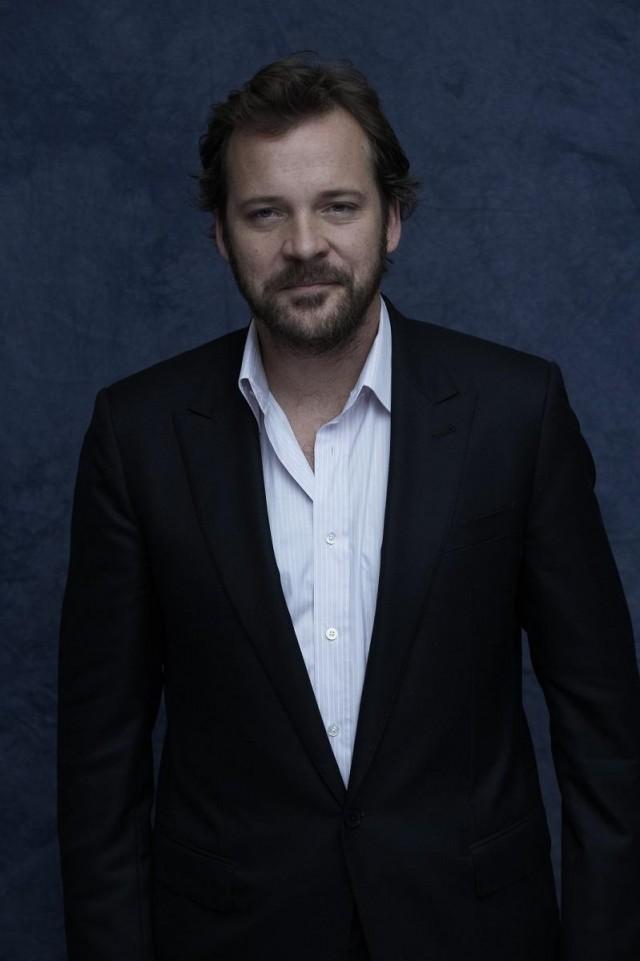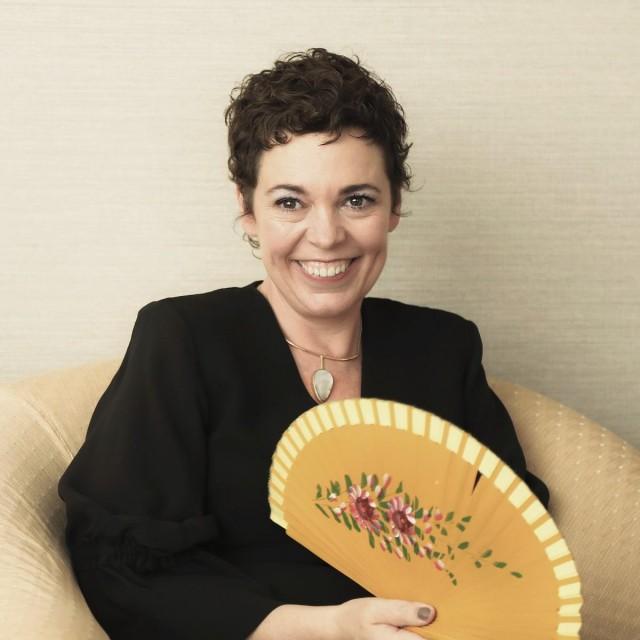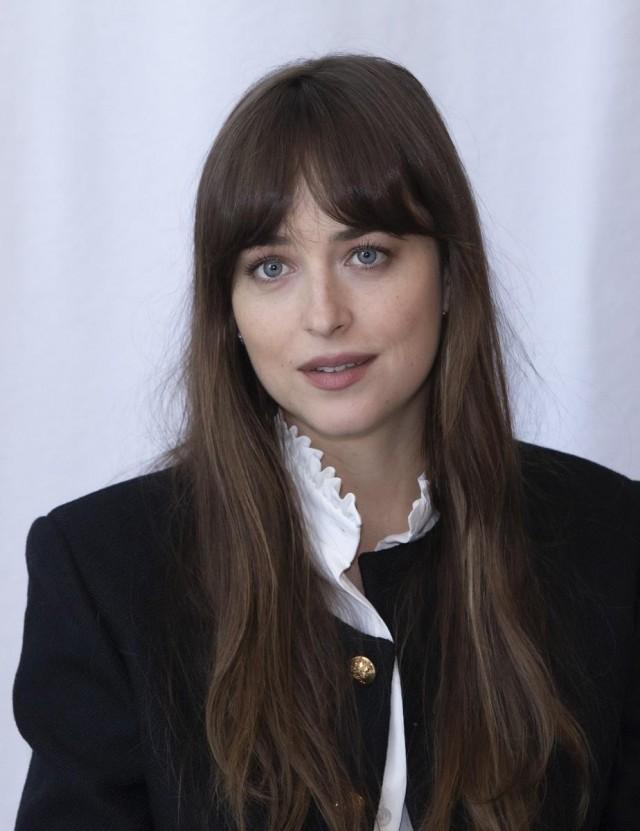Maggie Gyllenhaal on her directorial debut 'The Lost Daughter' with Olivia Colman, Dakota Johnson, Peter Sarsgaard
LOS ANGELES — We have always admired the quiet intelligence of Maggie Gyllenhaal and her refreshing, original approach to her various characters onscreen.
So, we were pleasantly surprised and proud when she daringly took on the task of director, writer, and producer on her feature directorial debut with the psychological drama, "The Lost Daughter" and even won critical acclaim and the Best Screenplay Award at the Venice Film Festival.
The very humble and charming actress, now 43 and a mother of two, spoke to us about her first film and was joined by her husband Peter Sarsgaard and stars Olivia Colman and Dakota Johnson.
Below are excerpts from that press conference at the Lido.
Maggie Gyllenhaal

What was it about the Elena Ferrante novel that made you say this is going to be my feature directing and screenwriting debut?
I had first read the Neapolitan novels years ago, and I had this experience when I was reading them, like oh my God, this woman is so f***** up. And then one millisecond later I thought oh no, I really relate to her, and so I am so f***** up or is this somehow an experience that many, many people are having but that nobody is talking about. And that is what I ended up coming to reading those books and feeling really comforted by that, like these are secret truths about a feminine experience in the world that I really liked having spoken out loud. So, then I thought well what if instead of sitting alone in my room with a book having this feeling, what would happen if you had to sit next to either strangers or your own mother or your husband or your own daughter and have these things revealed? It seemed like a dangerous exciting thing to try. So that was why I wanted to try to adapt it into a film.
Can you speak about the point in your career when you realized that you wanted to direct? And of all the directors you worked with, who do you think has helped you most thinking about their work when you step behind the camera yourself?
Someone asked me today what I learned doing this and obviously I've learned so many things. But one of the things I learned is that I think I’ve always been a director and I just didn’t feel entitled to admit it to myself. So weirdly, I think it was actually playing Candy on "The Deuce," playing a porn director on television, I kind of went, I think this is me actually. I think it's true, I think it's a better job for me.
I didn't actually work with Mike Nichols. I wish I had worked with him. But I once did a reading of a play with him, and I spent an afternoon with him, and he gave me a couple of directions that totally blew my mind. I have seen the work that actors have done when working with him and I think I do kind of hold him up, I really admire him, the way he talked to me was amazing.
These women get married; they have their kid; but each one of them is personally unfulfilled. It's like their own journey that maybe they wanted to have. They didn't get a chance to have it. Then slowly, as we see in the film, it's like what about me? How do I fulfill myself? What are the things that I want to do? There are ripple effects because of that.
I think so often we as actresses, as women, are presented with this sort of fantasy version of ourselves that we are doing things that we are like proud of or good, when in fact I think most people, including women, have a huge spectrum of things inside them. I would be really shocked to hear that there wasn't one mother, or that there was one mother who hadn't once thought what if I walked out the door? Now you are right, that doesn't mean that you do it, but here you are presented with someone who did, and you are asked to, I hope that the movie asks you, to look at the ways in which you are like her and which you have empathy and compassion for her. And then what are you left with, and it can be uncomfortable like what you are saying, but I think it can also be really comforting. I am not the only person who has had these thoughts which I wish I weren't having. And it's actually all of us.
What struck us was how confident, how self-assured the choices were in the adaptation and the directorial choices. Can you talk about the process of writing the script and choosing and making those choices, because for a first film it's incredible?
I actually was surprised to find that adapting a book into a screenplay is a similar muscle to being an actor, having a text and having to look at the text and say what is the essence of this piece of writing, why is this in the movie and also why is it in the movie in relation to me? You can imagine how actors are doing that all the time. And so, I guess I found both that that was a similar exercise. Here's a section of the book, maybe it's a scene where two people are eating octopus although that's not in the book, but something like that. And yet, what's the purpose of it, what is it really about? So that's how I went about the adaptation.
At first, I really followed the structure of the book. I held the book with me. I moved section to section like a very good student I think at first in a way. Then there came a point where it got wilder and that’s when it really started to come alive. Weirdly that happened, and I was like where's the book. I lost it in my office around the same time that Ferrante wrote that Guardian piece that I sent you where she basically said in The Guardian, she hoped that I and I don’t know her of course, we’ve written and exchanged a few really interesting, cherished emails, but she just hoped that I was making it my own. She says in this Guardian piece I hope, difficult as it might be for her to let go of what her book was, that I make it mine. So that really also was when it started to get hot for me.

Can you talk about working with and casting Peter?
I don't think directing is inevitable. I think it takes a lot of uphill battles. But Peter, to be completely honest, there was a moment where I thought maybe it's not a great idea to have Peter play the object of desire with an exquisite, intelligent gorgeous young actress. And I felt that way for I don’t know, maybe like six weeks. And then something just exploded in my mind, and I went you are so bourgeois, Peter and I have been together since I was 23 and I know he loves me. And I thought there isn't anyone that could play that part like him. And so, let's go.
And Jessie really, from the moment I had a Zoom call with her, I was like that woman is a sister. Peter did exactly what I imagined he was going to do—he surprised me at every moment, he blew the lid off of that character I wrote, I mean it became a living, breathing, like all of these incredible people, it was everything that I wanted it to be and beyond my wildest imagination. Peter and Jessie and I together say something honest about love and hunger and so there's not a moment of me that would have done it any different. And Alba is the same. Alba came in for two days. I thought maybe I will just send it to her. She was my dream to play this cameo in the movie. I thought what's the worst that happens, she says no, and I feel disappointed. I can handle it. But then she came like a lightning bolt into our film for two days and again, completely blew my mind.
Would you direct your brother Jake?
Yeah, that would be great. I would love to.
One of the uncomfortable truths that this film shows is about parenthood. Can you reflect on that and what you wanted to show about the reality of raising young children and being a mother?
I wish Jessie (Buckley, as the young Leda Caruso) was here, because Jessie is in Canada shooting a movie and stuck in her bubble. We wanted to show both the immense overwhelming joy and love and I think Leda, both when she is Olivia and when she’s Jessie, is full of love and love for her children. I mean the way on the phone when her daughter wants to hang up and your face like your heart breaks for a second, that's a mom. And also, to do this dangerous thing of opening up the truth of the degree of the darkness and perversity and desperation and terror that is also included in parenthood. What do you think Peter?
Peter Sarsgaard (Professor Hardy): What do I think? We are both parents of two lovely little children. I think that it was such an enormous pleasure to watch my wife really fulfill her talent. I think that's about all I have to say. Or I will cry. But because she has, for so long people have known what an excellent actress she is but being around her is truly inspiring. I think for all these actors, and they know that she has a real eye for an unconventional truth. There's the easy truth that we go around with every day, the way that we explain things, but then there's what's actually going on. And she’s unbelievably inspiring, that’s about it.
Olivia Colman (Leda Caruso)

The movie talks about how sometimes we sacrifice personal fulfillment. How did that resonate with you?
I know that all people, they want to be one person and it ends up that they are not that person, and they are somebody else. So that was something rather beautiful, to be able to play that and to play someone who does awful things sometimes. Earlier today, I was standing on a terrace, and I thought I could drop something really heavy, I won't, something in me stops me from doing that. But there's something about this piece and this character, you could do something you shouldn't do. And that was intriguing to me, to play someone that does something that I wouldn't do, although you sometimes think about it. So, I think that's what for me what was intriguing, and I think that's what we all felt a bit.
Leda is very much a two-part character with the past and present versions of herself. As actors, how much did you and Jessie Buckley collaborate to make that character really cohesive?
We didn't really. She was at the beginning, we overlapped quite a lot, chatted in the evenings and then I was filming after her. We just did, because Jessie and I are friends anyway, so we would text each other going what accent are you doing? So I was worried, going to Maggie how similar do we need to be, and Maggie went, whatever, it doesn't matter. We just worked out roughly where we came from. Just as any woman any way, any man, any person changes from 20 to 30 to 40 to 50, everyone changes, so it didn't matter too much I don't think. There's a good dollop of artistic license in anything. Both Leda's are feeling similar things. Yet they have had different lives, when I turned up, I had more life than Jessie had so it didn't really matter. I adore Jessie, so whatever she does is good in my book.
Dakota Johnson (Nina)

What do you think of these women who feel personally unfulfilled?
I think that I find and have found more in my life as it goes on that there are so many women in me and so many women in the women that I know. It's such an antiquated mindset that a woman is just one thing, that's never been the truth. For Nina in this film, which is a tricky thing because I at times felt so uncomfortable because she was so uncomfortable and in a really uncomfortable place to be in her heart and in her mind. It was fun sometimes to be so twisted but then other times it really hurt me to be involved with people that I loved so much working with and then to be working creatively in a way that I wasn't proud of myself; I didn't feel like that I was a good person. I guess Olivia found it really fun and I found it really hard.
What made you decide to join Maggie in her first directorial film?
Maggie and I had a meeting in New York, we had like a late lunch one day. We had met once before, at a party. I've always been just totally in love with her work and when I met her and I spoke to her, I find that she really catches me off guard all the time in a way that makes me want to evolve as a person and as an actress. And that is something that I find really rare in making movies now. I think that used to be a more common situation, where you had this quite special bond with your director, and you felt like you could unzip, and you were safe.
I felt both terrified and very safe at the same time with Maggie the whole time. And that was like from the beginning. I find her to be speaking a truth that no one is maybe speaking and seeing things that no one is seeing in a way where I want more of it and I wanted. It was months after our first meeting that she wanted to see me again, so I just thought that that wasn't going to happen. But it's the kind of relationship, artistic creative collaboration that is of dreams. It's something that I can feel, and I can smell and taste the experience working with her, and I think it will be like that forever. It's extremely visceral.
—MGP, GMA News




